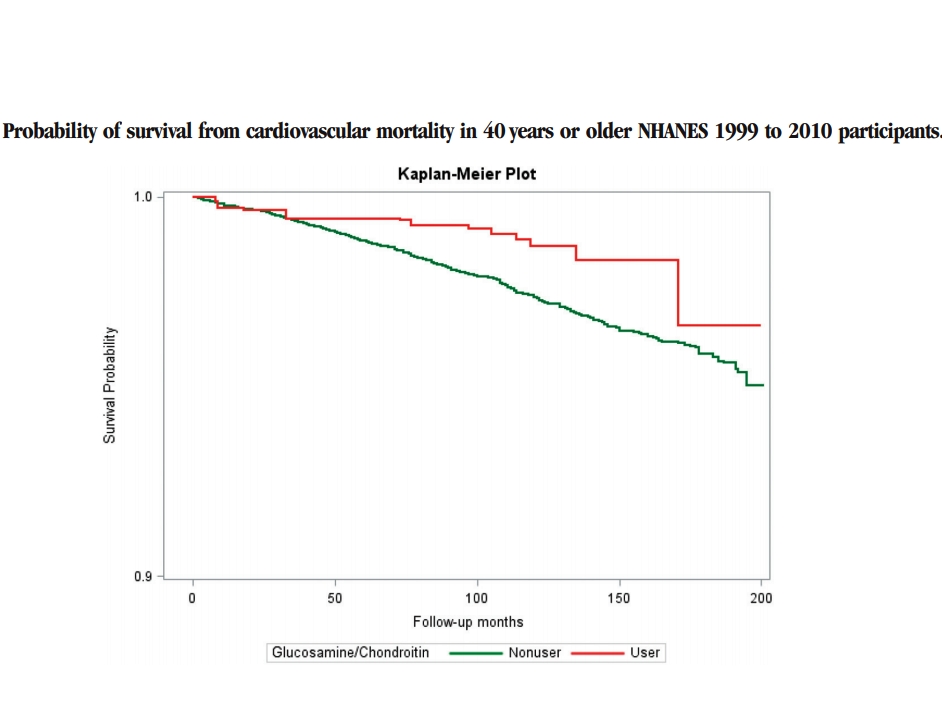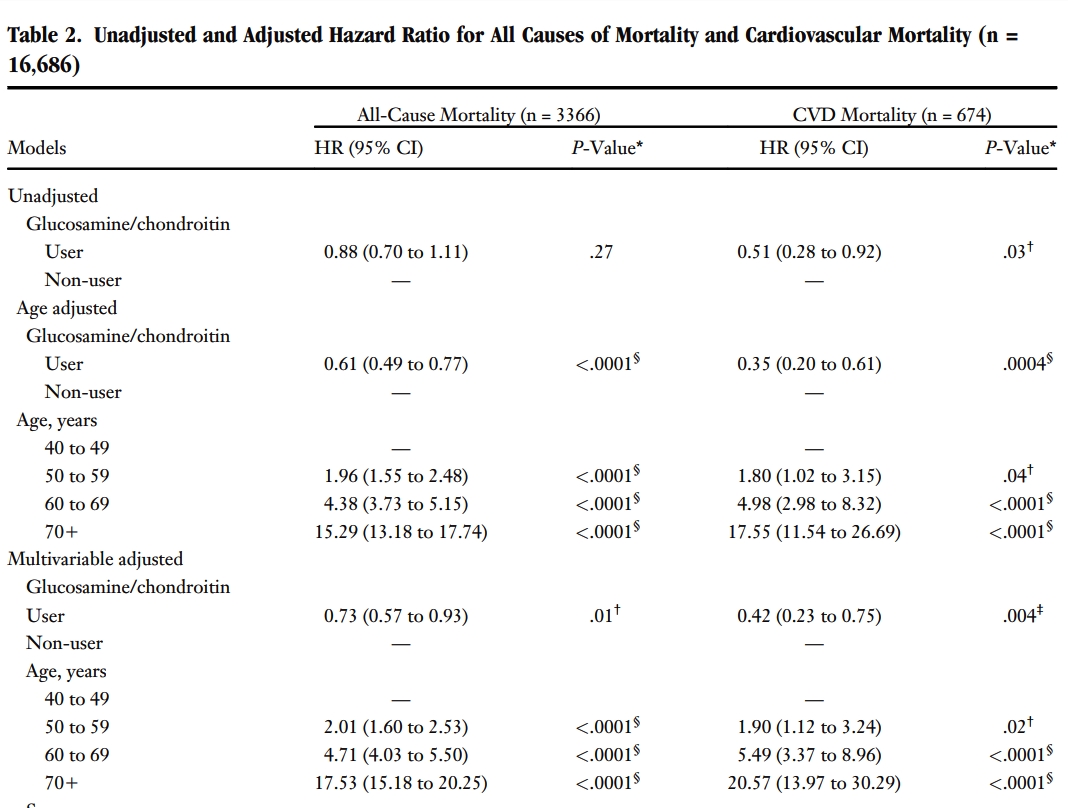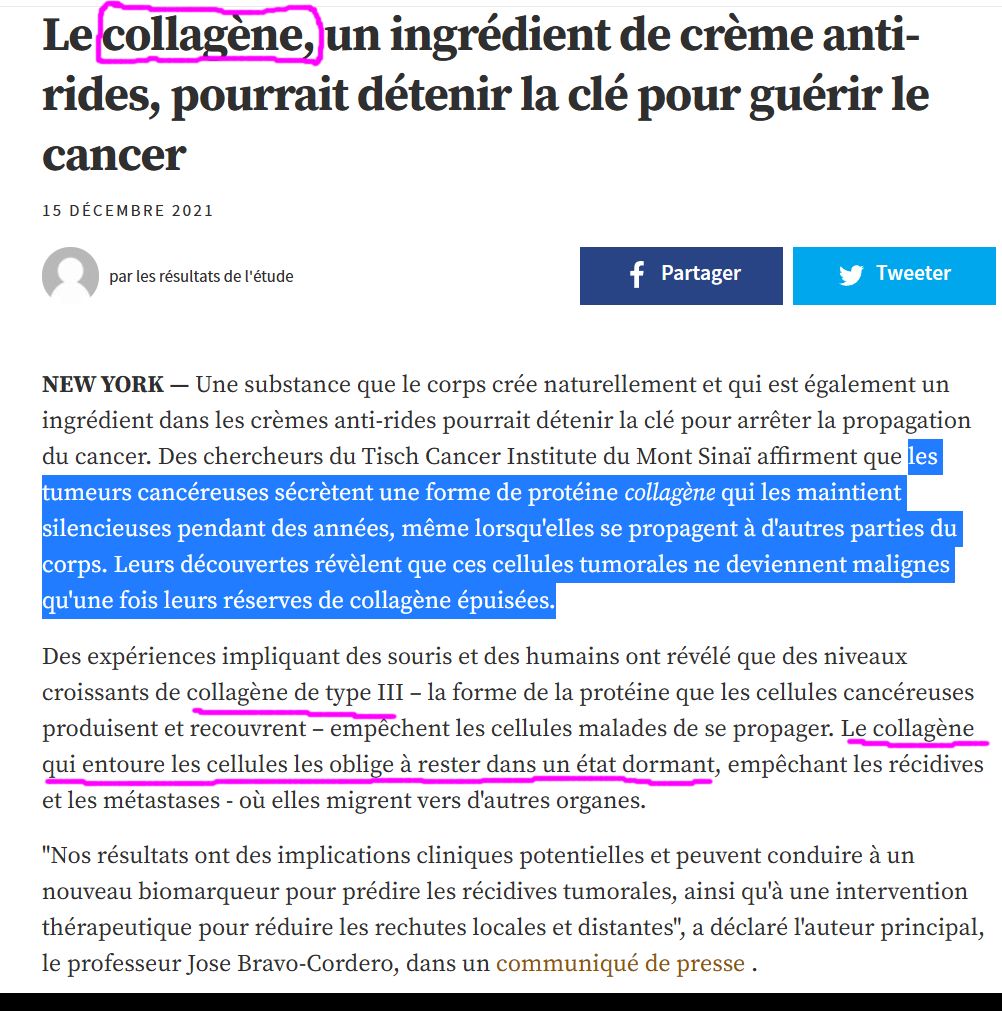Glucosamine/Chondroitin and Mortality in a US NHANES Cohort
Dana E. King, J Am Board Fam Med 2020;33:842–847.
Background: Limited previous studies in the United Kingdom or a single US state have demonstrated
an association between intake of glucosamine/chondroitin and mortality. This study sought to investigate the association between regular consumption of glucosamine/chondroitin and overall and cardiovascular (CVD) mortality in a national sample of US adults.
Methods: Combined data from 16,686 participants in National Health and Nutrition Examination
Survey 1999 to 2010, merged with the 2015 Public-use Linked Mortality File. Cox proportional hazards
models were conducted for both CVD and all-cause mortality.
Results: In the study sample, there were 658 (3.94%) participants who had been taking glucosamine/
chondroitin for a year or longer. During followup (median, 107 months), there were 3366 total deaths
(20.17%); 674 (20.02%) were due to CVD. Respondents taking glucosamine/chondroitin were less likely to
have CVD mortality (hazard ratio [HR] = 0.51; 95% CI, 0.28-0.92). After controlling for age, use was associated with a 39% reduction in all-cause (HR = 0.61; 95% CI, 0.49–0.77) and 65% reduction (HR = 0.35; 95%
CI, 0.20–0.61) in CVD mortality. Multivariable-adjusted HR showed that the association was maintained after adjustment for age, sex, race, education, smoking status, and physical activity (all-cause mortality,
HR = 0.73; 95% CI, 0.57–0.93; CVD mortality, HR = 0.42; 95% CI, 0.23–0.75).
Conclusions: Regular intake of glucosamine/chondroitin is associated with lower all-cause and
CVD mortality in a national US cohort and the findings are consistent with previous studies in other
populations. Prospective studies to confirm the link may be warranted. ( Glucosamine/Chondroitin and Mortality in a US
NHANES Cohort
Dana E. King, MD, MS and Jun Xiang, MS, MA
Background: Limited previous studies in the United Kingdom or a single US state have demonstrated
an association between intake of glucosamine/chondroitin and mortality. This study sought to investigate the association between regular consumption of glucosamine/chondroitin and overall and cardiovascular (CVD) mortality in a national sample of US adults.
Methods: Combined data from 16,686 participants in National Health and Nutrition Examination
Survey 1999 to 2010, merged with the 2015 Public-use Linked Mortality File. Cox proportional hazards
models were conducted for both CVD and all-cause mortality.
Results: In the study sample, there were 658 (3.94%) participants who had been taking glucosamine/
chondroitin for a year or longer. During followup (median, 107 months), there were 3366 total deaths
(20.17%); 674 (20.02%) were due to CVD. Respondents taking glucosamine/chondroitin were less likely to
have CVD mortality (hazard ratio [HR] = 0.51; 95% CI, 0.28-0.92). After controlling for age, use was associated with a 39% reduction in all-cause (HR = 0.61; 95% CI, 0.49–0.77) and 65% reduction (HR = 0.35; 95% CI, 0.20–0.61) in CVD mortality. Multivariable-adjusted HR showed that the association was maintained after adjustment for age, sex, race, education, smoking status, and physical activity (all-cause mortality,
HR = 0.73; 95% CI, 0.57–0.93; CVD mortality, HR = 0.42; 95% CI, 0.23–0.75).
Conclusions: Regular intake of glucosamine/chondroitin is associated with lower all-cause and
CVD mortality in a national US cohort and the findings are consistent with previous studies in other
populations. Prospective studies to confirm the link may be warranted.
















